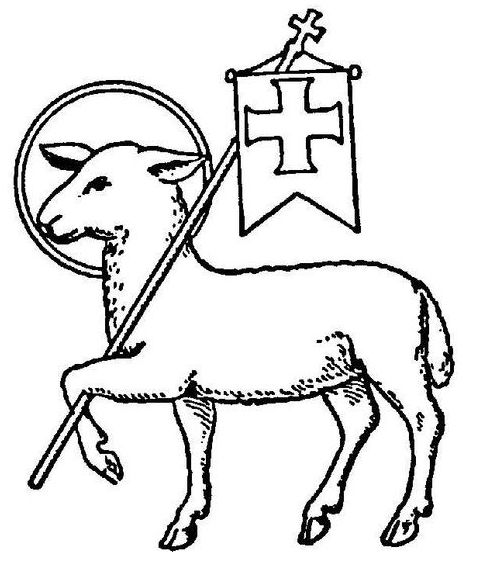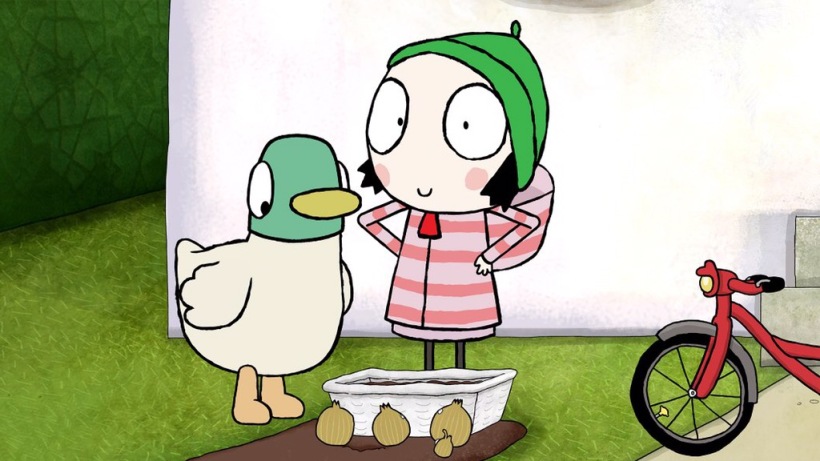“The Christian apprehension of creation requires and involves the principle that creation is benefit. It shows us God’s good pleasure as the root, the foundation and the end of divine creation.”
-Karl Barth, CD III.1 p.331
“God’s gracious action in creation belongs from the first to that delight, pleasure, and regard that the Trinity enjoys from eternity, as an outward and unnecessary expression of that love; and thus creation must be received before all else as a gift and as beauty.”
-David Bentley Hart, The Beauty of the Infinite, p. 249
Being a father of two young children you come across things you would not otherwise discover if you didn’t have kids. In particular we came across a wonderful cartoon called “Sarah and Duck”. It is a British cartoon in which a 7 year old girl lives life with her pet duck named “Duck”. They do very quirky and fun things in each episode, all filled with the joy of existence. What I enjoy most about the show is how everything in creation (bugs, the moon, clouds, rainbows etc) all are charged with a personal existence, and joy is an essential part in which Sarah and Duck participate in. It sees the ordinary as something deeply joyful and magical; from shallots desiring to be acrobats, to bugs playing in a bluegrass band for a bug party, or Venus rearranging the stars; all of creation is important and interesting. Creation here is not something accidental, but purposeful, good and meant to be explored and enjoyed. Here is a little clip of the show. I highly recommend it.
In a way the show reflects something very true about creation and the way we should see it and experience it. To see creation the way God sees it we must become like children; to enter the kingdom Christ says we must become like little children. (Matthew 18:3) Moreover, David Bentley Hart in his book ‘The Beauty of the Infinite’ gives us some reflection on creation and delight:
“The delightfulness of created things expresses the delightfulness of God’s infinite distance. For Christian thought, delight is the premise of any sound epistemology: it is delight that constitutes creation, and so only delight can comprehend it, see it aright, understand its grammar. Only in loving creations beauty — only in seeing that creation truly is beauty — does one apprehend what creation is.” (p. 254)
Growing Old
“It may be that He has the eternal appetite of infancy; for we have sinned and grown old, and our Father is younger than we.”
G.K. Chesterton, in a post I shared earlier, says that God “has the eternal appetite of infancy” and we have sinned and grown old. I came across these words of Chesterton’s months ago, and I can’t seem to get them out of my head for even one day. Possibly because it reveals so much in myself about my condition and how I spend my days running from the truth of who I have become. I have sinned and grown old. The days are spent looking at screens, and going to bed looking at screens. Even though a lot of my time looking at screens tends to be for school and writing, even now as I write this post, it is still shaping my idea of what delight is. Or it is eroding whatever delight I have left in me for the ordinary things around me. More than this I feel the aching of longing for Christ to return and restore the beauty and peace creation began with. I no longer take much true delight in the gift and beauty which creation is.
Recently I finished reading the second novel in C.S. Lewis’s space trilogy “Perelandra”. Lewis has a way of penetrating through and cause you to live in wonder with his writing even if it is for just a moment. This theme of growing old comes up when Ransom (the protagonist) meets the Green Lady (Eve). The Green Lady represents what humanity was before the fall. Ransom is sent to Perelandra (Venus) by Maleldil to keep Green Lady and the King from falling the way of the people on Thulcandra (Earth). When Ransom encounters the Green Lady he struck by her radiant beauty and innocence. He struggles to find the words like “evil” in her language, because she does not know of sin and evil. In their conversations the Lady says that their conversations make her grow older. A phrase she uses is “come, let us grow older” in reference to conversation and knowledge. As the story moves on, sure enough evil finds its way to Perelandra in the form of Ransoms nemesis Weston. “It”, as Ransom refers to Weston’s body, attempts to get the Green Lady to lived on the fixed land because Maleldil has forbidden it. In the end, spoilers, the Lady and the King do not go the way of Adam and Eve, and are crowned at a year long ceremony. The King makes an observation about growing old properly and growing old like Adam and Eve. Maleldil caused them to grow older in a way that was not corrupting.
We however have grown old in the corrupted way. What we need is the Word to take up residence in our hearts and make us young again. Through growing in knowledge of Christ (2 Pet 1:3, 2:20, 3:18) we will escape corruption and be fashioned in His image. In this way we may begin to see creation as a gratuitous gift overflowing from the eternal Triune love of the Father, Son and Holy Spirit.
Rhythm
Bonhoeffer in his wonderful book ‘Creation and Fall Temptation: Two Biblical Studies‘ in which he comments his way through the first three chapters of Genesis dealing with creation. When Bonhoeffer comments on verses 4-5 in which God separated the light from the darkness, he writes that for us the ‘creatureliness and miraculousness of the day has completely disappeared. We have deprived the day of its power. We no longer allow ourselves to be determined by the day. We count and compute it, we do not allow the day to give to us… for technology is a campaign against the day.’ (Creation Fall, p. 28) For Bonhoeffer the six days of creation do not mean days in a computable sense, “it thinks of it in terms of the power of the day which first makes the physical day what it really is, the natural dialectic of creation”. (ibid, p. 29) What Bonhoeffer means by this what the day in its rhythm points to:
“In the morning the unformed becomes form and then by evening sinks back into formlessness. The bright polarity of light dissolves into unity with the darkness. Living sound grows silent in the stillness of the night. An expectant awakening in light follows sleep… The rhythm- repose and movement in one -which gives and takes and gives again and takes again, which thus eternally points towards God’s giving and taking, to God’s freedom on the other side of repose and movement- that rhythm is the day.” (p. 29)
Shallot Acrobats and Communion
What does this all have to do with a children’s cartoon? Well, everything. To delight in creation the way a child does is the way we begin to see it the way God intended for us. We live in the aftermath of the fall, in the brokenness and mire. The good news is that God became man, and in becoming man broke into our existence to reconcile all things to Himself, and to consume the world with His presence like the burning bush. Let us pursue delighting in what God has made, and what He is currently in process of reconciling and restoring. Let us be like the little children. Shallot acrobats point us to the eternal pleasure, delighting and communion of Father, Son and Holy Spirit.


